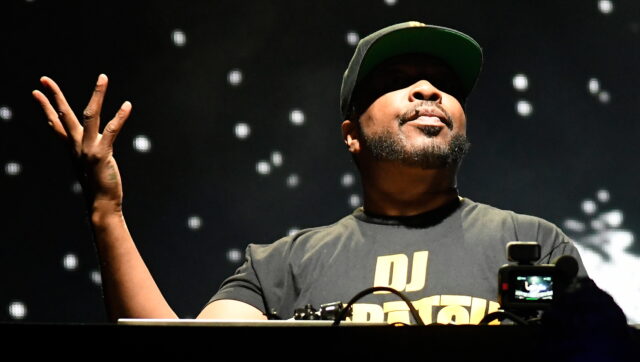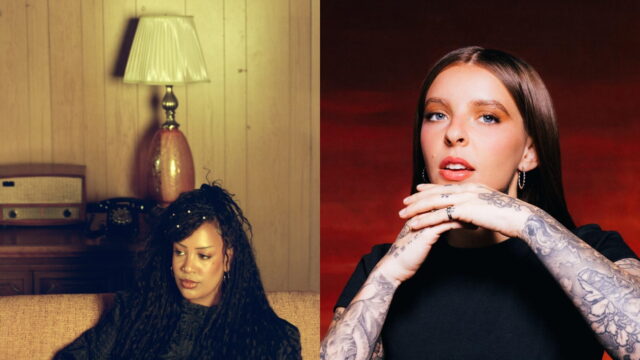Nine Songs with Kassa Overall
The jazz drummer listens to Geri Allen, Miles Davis, A Tribe Called Quest and a song he made with Danny Brown.

Drummer-producer Kassa Overall recently released CREAM — instrumental interpretations of hip-hop classics by the Notorious B.I.G., Wu-Tang Clan, Dr. Dre, A Tribe Called Quest, OutKast, Digable Planets and Juvenile. Recorded primarily acoustic and without overdubs, Overall leans into his jazz pedigree to bring new life to these works. Tidal played Kassa nine songs that explain his style and inspired the making of CREAM.
Larry Young
“Monk’s Dream”
1966
I just realized [jazz drumming legend] Elvin Jones is like the Ol’ Dirty Bastard of his time. He has the most unique style. And it’s funny, the more life I live, the more I study music, I always feel like, “Oh, I need to go back and see if I can understand Elvin Jones more,” you know? Because I studied him back in the day, and I was probably studying him way more than I do now, but I think I have a little more understanding [now]. So, maybe if I go and try to transcribe it now, I might actually be able to understand it more. Another funny thought I was thinking, the way [organist] Larry Young is playing, it is almost like he is saying how much he loves Elvin. He’s playing all these little lines that are similar to Elvin Jones’ phrasing. Like the way that he’s breaking up the triplets and all that stuff. Elvin’s an interesting character because not everybody understands him. But those that do, they’re damn near campaigning for him, you know? Like, “Yo, this is it. Yeah, this is it.”
How would you explain to a non-drummer what is so special about Elvin?
To a non-drummer? First off, I think that a non-drummer would be able to understand that. You don’t have to know anything to feel that it feels different. But to try to explain it a little bit is: The way he interprets time is so natural and so connected to nature. It feels directly lined up, like in the way that you see time in the ocean or when you see a tree swing in the wind. Or when you hear raindrops falling on a tin pan outside your window when it’s raining. That natural kind of circular feel. You can hear metronomic time in nature, but it’s so organic, and that’s how Elvin sounds to me. And I think what it does is it leaves him being an extremely unique player, and anything he plays — it could be the most straight-ahead, normal, everyday pattern that tons of people play — but the way he plays it, it still just sounds like him. Yeah. Awesome.
Miles Davis
“Freedom Jazz Dance”
1967
The thing about [drummer] Tony [Williams] is he’s such an abstract impressionist kind of a player, you know? [My band] was just talking yesterday, we were doing the whole debate about: “Is Tony Williams funky or not?” If you compare him to, like, a Clyde Stubblefield or somebody, he doesn’t give you that. But when you listen to him play, you realize that he’s approaching the music from the harmony and the melody. He’s dealing with grooves — and this song is actually closer to him dealing with a pocket — but he’s abstract, and the whole idea of the pocket, he never gives it to you. He’s conversing with elements, but he never really gives you the basic thing. And so I realized that Tony is absolutely an abstract impressionist kind of a painter. And that he’s allowed to get to that by not being tied to, “I gotta give you this groove.” It’s so special. Another interesting thing about this recording is that they’re playing “Freedom Jazz Dance,” but it’s almost like when they go into the solos, they’re still playing “Freedom Jazz Dance,” but they’re all playing abstract. They play “Freedom Jazz Dance,” and then they go to this whole other portal. And “Freedom Jazz Dance” just is kind of the context in which they’re creating this thing. And it kind of reminds me a little bit of some of the intentions of [CREAM].
I hear a lot of Tony in your playing on CREAM. Do you feel that coming through?
Yeah, but I wouldn’t even say it’s on purpose. There’s a lot of Tony in my playing, period. There’s a lot of Tony, and there’s a lot of Elvin, and I can’t not, you know? And even in the structure, the arrangement of our version of “Freedom Jazz Dance,” Bendji Allonce is playing conga, kick drum and clap stack. So he’s playing that, and if you see the way that Tony’s playing, especially at certain periods of this song, he’s playing something that would go on top of a groove well. So Bendji put down this base layer that allows me to Tony-out. But it also allows the listener to still stay in context while Tony-out.
Herbie Hancock
“Rain Dance”
1973
That’s one of the best recordings ever. [Hancock’s Mwandishi group], I think, didn’t actually do that well commercially. But at the same time, the funny thing is, people with a lot of artistic depth look at this band as [Herbie’s] best band. If this came out today, bro, this shit would blow up, man. This shit would be like — it sounds so fresh! It sounds fresher than whatever’s coming out now, even. Even the electronics and stuff, it sounds crispy. There’s so much happening, but it’s also blending together. This was a band that had a language. They were able to put all these different elements together and use space and … man, it’s so killing.
You were a student of [Mwandishi drummer Billy Hart], and there’s such a clear through line from Billy’s playing in this band to the work you’re doing now. Did you ever talk to him about playing in this kind of electric setting? Or do you think that his style just comes through and applies and whatever sort of setting he is playing?
I know what you’re saying, and I think that him having the depth that he has, you know, he’s like an extreme student or academic. I don’t know what you want to call it, but he’s a researcher. And so he knows musical language from so many different perspectives that I think you could put him in anything and he could figure out how to be Billy inside that, and he can always stay Billy, no matter what he’s playing. And I don’t know if everybody’s like that.
Geri Allen
“No. 3”
1990
The thing that really pops into my head on this is the composer-drummer Lawrence Williams, who was Marcus [Belgrave’s] man. And this tune, there’s something about this tune that could only be written by a drummer. You know, the loop, the bobs and weaves of the form. And it’s funny because when I’m thinking about the arrangements on the CREAM record, it’s a similar kind of thing. I didn’t think it was anything special until we started playing it or people started trying to play it. And they’re like, “No, this is different. This isn’t just regular.” I’m like, “Really?” But it also has to do with all the work we’ve done as drummers, having developed the language of the push and pull, and of the twos and threes, and how that fits into harmony and everything, you know? And, yeah, I just miss Geri.
This track is from the album The Nurturer, and my understanding is that it is in part a tribute to Marcus Belgrave, who mentored Geri. As someone who was in turn mentored by Geri, talk a little bit about that experience.
Yeah, I mean, Geri was “The Nurturer” for sure for me. There’s one funny story that comes to mind that I kind of tell from time to time. I was on tour with Geri. We were walking around in Europe, we’re in the airport. And I used to cuss a lot at the time, and I thought it was kind of a sense of sovereignty or something that I was, you know, I’m a grown-up and I can cuss and whatever. And I got into an argument with one of the other band members. And I thought I was right, and he was wrong, but I started cussing, and then he says, “Don’t cuss in front of Miss Allen like that.” And kind of out of a technicality, I lost the argument. So now we’re walking to the gate, and it’s just me and Geri. And I swear, she doesn’t say anything to me, she just hands me half a sandwich. And I take the sandwich, and I start eating the sandwich. And I remember, as I’m eating the sandwich, my nerves, kind of everything, I just start calming down, and I realize: “Oh, I’m trippin’.” Whether I’m right or wrong or whatever, I’m hungry, I’m a little kid, I’m a child, and I’m running around trying to be a professional musician and she just was like, “Dude, eat a sandwich. Calm down. What are you doing? I’m flying you around the world to play drums. Like, chill, bro.” Yeah. But she was very subtle like that. She could really just say a lot with a little gesture like that.
Gary Bartz
“Gentle Smiles (Saxy)”
1975
Listening to this record makes me think about how Gary has been on the front lines of pushing boundaries of music and genre constraints for a long time. Not only has he been trying to push the boundaries, but he’s been hitting his shots, you know what I mean? He knows something about music to where — I don't know if it would normally work to, like, have a sax melody and to sing, “Play it saxy for me” over the melody. You know what I mean? Like, it’s not supposed to work. But it works really good.
When you were a student at Oberlin Conservatory of Music, where Gary Bartz was a teacher, did you know how much of an influence Gary had had on hip-hop?
No. I didn’t. Not even a little bit. But I do remember one time he walked in the room and he was like, “Yo, I went to see Sheek Louch with my grandson yesterday.” He went to see one of the LOX’s solo performances. And it was just so deep cut to me that that’s what [he went to see]. And he said it like he knew what he was talking about, you know? He’s pretty dope. He keeps his ear to what’s happening. He never lets it become a thing where it’s like, “Ah, this new thing is useless.” He never says that about music. You never hear him saying, “Oh, that’s garbage,” you know? A lot of older [artists] find themselves in that position of talking about something, because they really just don’t like it. They can’t get with it. And if you can’t get with it, you can’t get with it. But Gary, he is actively engaged in making sure he’s open to get with something. Whether that’s a new book or a new artist, you know, he’s like, “What’s happening?” He stays young and he’s the prototype for how to live an artistic life.
A Tribe Called Quest
“Check the Rhime”
1991
So I have an admission to make. Of all the songs on the new record, this is the one song that I have the least childhood connection to. All the other songs, “NUTHIN BUT A ‘G’ THANG,” “REBIRTH OF SLICK (COOL LIKE DAT),” every other song, I could damn near tell you the first time I heard it, and I wore tapes out. But for Tribe, I really got into Tribe on Midnight Marauders, and I fell in love with Beats, Rhymes & Life. But I think a lot of people that were older than me felt like Beats, Rhymes & Life was when their shit got lighter to them. Turns out, [Beats, Rhymes & Life] is the album that J Dilla really was producing a lot on. And I fell in love with that feel. But anyways, I say all that to say, I remember the hook: “You on point, Phife? All the time, Tip. You on point, Phife? All the time, Tip.” It just felt like it would go so well with this kind of sound I was working on, with the sax. It just felt like I needed one of these. And I was looking for a Tribe song, and this just felt right as opposed to “Award Tour” or “Phony Rappers.” This one just works.
Was your love of jazz and hip-hop always concurrent, or did one come before the other?
Concurrent, but separate. I really did fall in love with playing the drums, and I love jazz. But a lot of that came through my mom and dad, but my dad really put me on. But at the same time, I was falling in love with what I was hearing just in my own world. I remember it was very separated. It was like this serious practice of jazz and eventually lessons, and then this social practice of hanging with my friends and listening to the songs we liked, and trying to write rap and stuff were two very different things.
Makaya McCraven
“Inner Flight”
2018
This is so dope. Shout out to my bro, Makaya. He makes intricate music, you know? I think I make intricate music, too, where if you listen to it on an iPhone speaker, you might not really understand the level of detail happening. But the drummer-producer, he knows how to make it sound and feel right.
One thing that Makaya McCraven is known for is recording live performances and using that as sample material. I know that’s something that you have done also. Did he inspire you to do that or where did you get that idea?
Actually I started doing that, and I was doing it more in the studio. But I started doing it, and one of the first things I heard was, “Oh, you’re doing what Makaya McCraven does.” I might have known him, I knew he was playing with Marquis Hill and I was playing with Theo Croker, and I’d met him a few times, but I didn’t know he was doing all this dope shit. But I got hip quick, and now I’m inspired by him greatly, because I think that we have a shared history of not only loving the drums, but we’re children of the sequencer, sampler, we understand that language, so we’re sitting in the same kind of position. We’re both working in these same fields, and he comes to my shows and I go to his shows and it’s always like, “Oh, so what are you doing? That’s how you did that? Are you using a click?” And it’s great to be able to talk to somebody like that because not everybody’s gonna understand the different elements and influences, you know? And I’m just glad to be in the same world as him. Also, one of the things that makes Makay’s music unique is that he plays the drums in a specific, unique way. And one of the things that makes my records unique is the way I approach the drums. So, if you want to copy Makaya McCraven, or copy Kassa, first you have to copy the whole way I play the drums and then figure out how to do all the [other stuff I do]. There’s a lot of other people kind of dealing with this kind of stuff, but the way they approach the drums, they might not have the old cymbal beat. And that is kind of a part of my recipe.
Danny Brown
“Jenn’s Terrific Vacation (feat. Kassa Overall)”
2023
That was a great experience, making some records for Danny. I would say sometimes you get a little lucky when you have a concept that you try to put together and it just comes together and you’re like, “If I try to sit down and make 20 beats like that, I don’t know if I could.” It just kind of comes when it comes.
Other than your drumming style, which is obviously a very prominent component of this beat, is there anything about your production style — such as your process or the technology you use — that you think is particularly unique to your approach?
For sure. I think it’s all inspired by my drumming. Even my sensitivity to sound and rhythm is inspired by drumming, but not necessarily like the way I play drums, you know? If you look at a Brian Blade, for example, the way he can play so light and heavy — and that kind of connects to Elvin Jones a little — but with Brian it’s very obvious. When you apply that kind of sensitivity, it’s like he’s feeling that sound in his body. When you apply that to Ableton or to an MPC and you’re listening so closely that you’re getting inside every little detail, then you might actually go in there and carve out some silence in different spots. A lot of that comes from just a sensitivity — I have a very sensitive kind of body and ear. So maybe I’m connecting things that aren’t normally connected and I think that comes from [not wanting] to make a good version of something that [has already been] done — I have no interest in doing that because that’s not really what I’m here to do. I’m here to try to find something that represents something that I’m bringing to the table.
Kassa Overall
“FREEDOM JAZZ DANCE”
2025
I think this track actually represents when we figured out what we were doing [on the record]. Because this was the second recording session, and I have to give a lot of credit to my partner, co-producer, fiancé, baby mama, Lauren Du Graf, because I think what we started to notice after the first session was that leaning into the acoustic nature of this music is really what’s making it unique. And normally, I would have Bendji play a clap and a kick on an SPD, to give it a real hip-hop [feel]. Like, maybe an 808 or something. And when I first started chopping up the idea and the arrangement, she said, “Why doesn’t he just play a real kick? You’re going to this studio and you have all these instruments.” And from that point on, we didn’t do any more electronic stuff. There were two songs on the first session that had SPD and electronics and some vocals. We didn’t use those for the album. We [started] leaning into this idea of, “What would Rudy Van Gelder do? Let’s record it in one room and get all of the mic bleed.” So that really sealed the deal. Like, if we can approach hip-hop through acoustics and mixing it to really give it the hit, that was big.
This is the only track on the record that isn’t a cover of a hip-hop classic. Is there a significance to this song in particular?
I think it became significant. It felt like having one tune on there that just has this homage kind of energy or kind of opening of a gate kind of energy. That’s why I thought it was strong to be the first song on the album. I don’t think it’s necessarily the most marketable first song, if you’re thinking about streaming and you’re thinking about people just throwing the album on. Maybe “REBIRTH OF SLICK (COOL LIKE DAT)” would have been better. But you gotta balance that versus your artistic thing. And I think on an artistic level, first off, the whole album starts [imitates opening percussion line]. Like, that’s hard. No matter who you are, you’re like, “What’s going on? I think this might be fire.” But then it gets pretty abstract and out, and I don’t know if it’s necessarily your marketing guru’s first song pick, but I fought for that to be the first song, and I thought, having a jazz tune and the word freedom in there, it’s kind of like opening the portal and getting the elders’ blessings or something.



